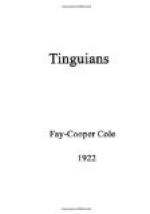Transfer and sharing of property.—Land and houses are seldom transferred, except at the death of the owner, but should a sale or trade be desired, the parties to the contract will make the bargain before the lakay and old men, who thus become witnesses. A feast is given at such a time, and is paid for by either the seller or the buyer. The sale or barter of carabao, horses, valuable jars, and beads may be witnessed in this manner, but the transfer of personal property is purely a matter between the parties concerned.
If a man works the property of another, he furnishes the seed and labor, and the crop is divided. If an owner places his animals in the care of another, the first of the increase goes to him, the second to the caretaker. Should an animal die, the caretaker must skin it, and give the hide to the owner, after which he is freed from responsibility, but he is liable for the loss, theft, or injury to his charges.
Murder and Theft.—The relatives of a murdered man may kill his assailant without fear of punishment, but, if they are willing, the guilty party may settle with them by paying in Chinese jars, carabao, or money. The usual payment varies from fifty to one hundred pesos. A thief is compelled to make restitution, and is also subject to a small fine.
The practice of evil magic, and the breaking of a taboo, are considered serious crimes, but as they have been treated under Religion and Magic, they will not be repeated here.
Lying, Cheating, Breaches of Etiquette.—Falling outside the realm of law are those things which may be considered right and wrong, but the infraction of which carries with it no penalty. Lying, for instance, is not bad, if it is done to protect yourself or a friend, but falsifying without purpose is mean and to be despised. Cheating is not wrong. Your ability to outwit the other person is proof that you are the smarter man.
It is bad manners for a man to sit with his legs far apart or to expose all of his clout, or for a woman to sit on the floor with one leg drawn up. A person should not walk about while others are singing or dancing. Basi should never be drunk, until it has been offered to every one present, especially the elders.
Before eating, a person should invite all in the room to join him, even though he does not expect them to accept. A visitor should never eat with the wife of another during his absence.
Always call before entering a house. Never enter a dwelling, when the owner is away, and has removed the ladder from the door. Never enter a village dirty; stop and bathe at the spring before going up. Only dogs enter the houses without bathing.
The Village (Plate XXXVIII).—A village generally consists of two or three settlements, situated near together, and under the authority of a single lakay or headman. There is no plan or set arrangement for the dwellings or other structures, but, as a rule, the house, spirit structure, and perhaps corrals are clustered closely together, while at the edge of the settlement are the rice granaries and garden plots. Formerly a double bamboo stockade surrounded each settlement, but in recent years these have disappeared, and at the time of our visit only one town, Abang, was so protected.




